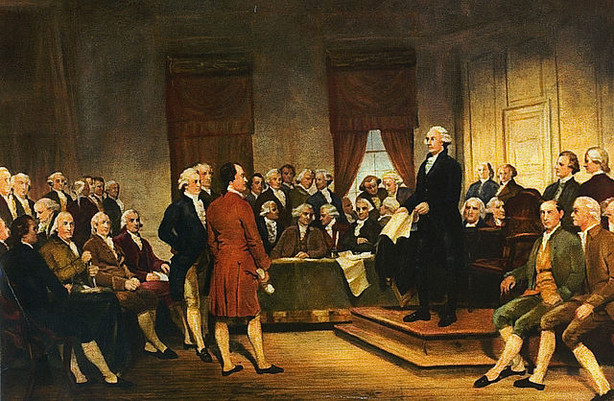BYU researchers: Fatherhood played key role in founders’ influence on Constitution
New BYU research shows that “Family experiences shape who we ultimately are and what we ultimately value”. (Shutterstock)
PROVO – Every weekend on July 4th, the Founding Fathers of the United States are celebrated for their role in shaping the nation’s government and creating a legislative system that continues to this day with some changes and additions.
In other words, “founding” is often the more celebrated performance of men like George Washington, James Madison, Benjamin Franklin, and others in the First Constitutional Convention.
Research from Brigham Young University, however, suggests that the role of “father” also played a crucial role. In the case of these fathers – both literally and foundationally – more sons led congress attendees to advocate stronger national government, while fathers of daughters preferred greater state authority, according to Jeremy Pope, professor of political science at BYU and former BYU- Student Soren Schmidt, who recently graduated from Yale with a law degree.
“There is a temptation to think of the Constitution as a simple written document,” said Pope. “But when you start looking at it, you find that it was quite complicated.”
A variety of factors influenced the drafting of the U.S. Constitution, with family relationships being just one of them, Pope said. But these relationships played a significant role that was often overlooked in modern historical circles and should not be ignored.
“I think it’s fair to say that we underestimate the importance of our family relationships in politics,” said Pope. “All of our relationships are important, but I think we underestimate the family and how much that shapes our political views.
“We tend to think of the past as statues and images frozen in time. But these were real people who had real family concerns. They cared more about their sons’ careers than their daughters, but family was still important. “
In the 18th century, sons had “relatively far more diverse career prospects” than daughters, who were “undoubtedly important and loved, but would eventually be married into another family,” according to Pope’s study. This proved true for the sons of the delegates to the convention in two ways – many of whom could envision political aspirations for their sons.
“The delegates to the Congress could think about the fact that their sons not only become lawyers, merchants or plantation owners,” write Pope and Schmidt in the American Journal of Political Science, “but also recognize political future prospects.”
 General George Washington at the 1787 Constitutional Convention and signing the US Constitution. A new study, co-authored by a BYU political science professor, found that the paternal status of the founding fathers played an important role in shaping their political views. (Photo: painting by Junius Brutus Stearns, public domain)
General George Washington at the 1787 Constitutional Convention and signing the US Constitution. A new study, co-authored by a BYU political science professor, found that the paternal status of the founding fathers played an important role in shaping their political views. (Photo: painting by Junius Brutus Stearns, public domain)
There is evidence that fathers of daughters may have preferred the status quo to a radical change of government, namely because sons – rather than daughters – at the time were more likely to take control of the government that the founding fathers established.
But that also resulted in the fathers of these women bringing their own voices – including their daughters’ prejudices – to the constitution.
“Our research shows that the differences caused by the gender of the children of the delegates were large enough to influence the procedures of the convention and thus the structure of the US constitution itself,” Schmidt said in a press release. “In other words, it was very important that our founding fathers were real fathers too.”
It’s similar to contemporary political and legislative discourse, Pope said, citing research showing that politicians with more sons than daughters tend to lean more to the right, while judges with more daughters than sons often make more left-wing decisions.
Then it should come as no surprise that the early settlers of the United States – most of them immigrants from the British Isles and other European countries – were drawn in similar directions.
“Our family experiences clearly shape who we ultimately are and what we ultimately value,” said Pope, who recently published a book about early fathers called “Founding Factions: How Majorities Shifted and Aligned to Shape the US Constitution.” “Good family experiences make your life better and also more optimistic about today’s world. Bad family experiences make you less optimistic about the world.
“I’m sure my three daughters have changed my view of the world,” he said. “There are all kinds of subtle things that roll through our lives and I think we take families for granted more than we should. So I hope that through this paper, people can take families more seriously. “
Of course, the constitution wasn’t determined by how many children either of the founding fathers had, Pope quickly adds. It was complicated enough that the family situation probably played a role, but there were also several interests that influenced it – things like a job or whether or not to keep slaves.
Family relationships were just one important factor.
“There were all sorts of things that were important,” said Pope.
×



Comments are closed.